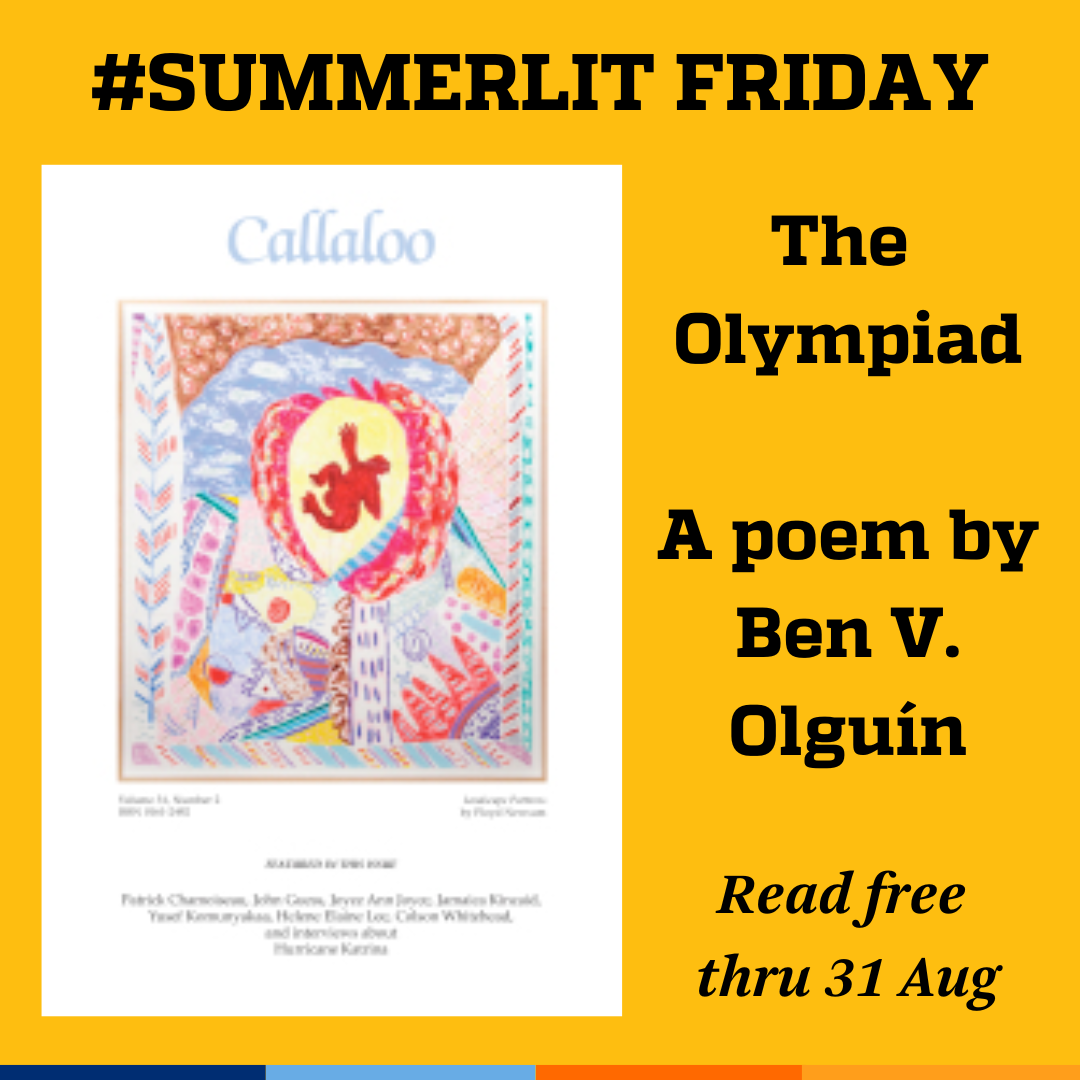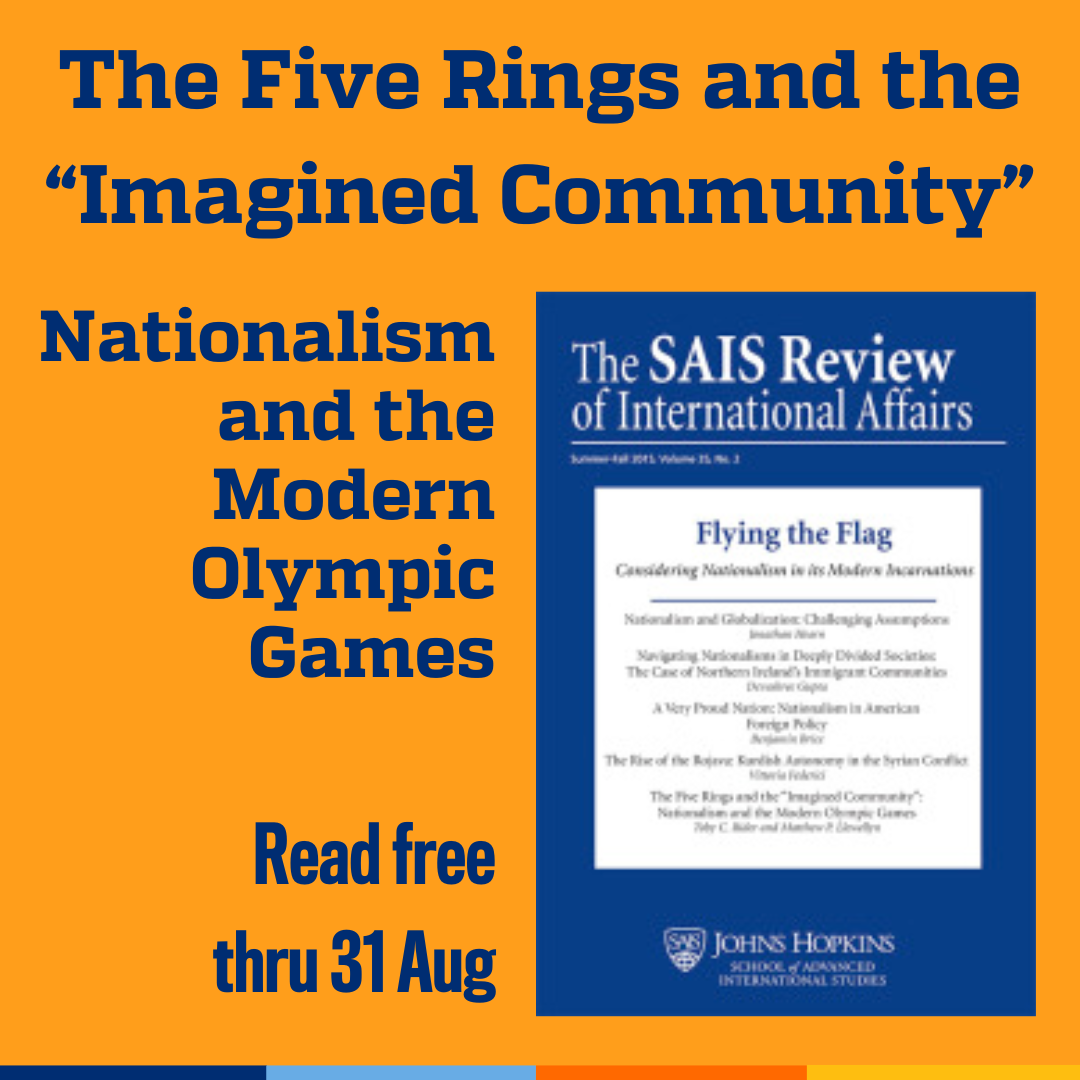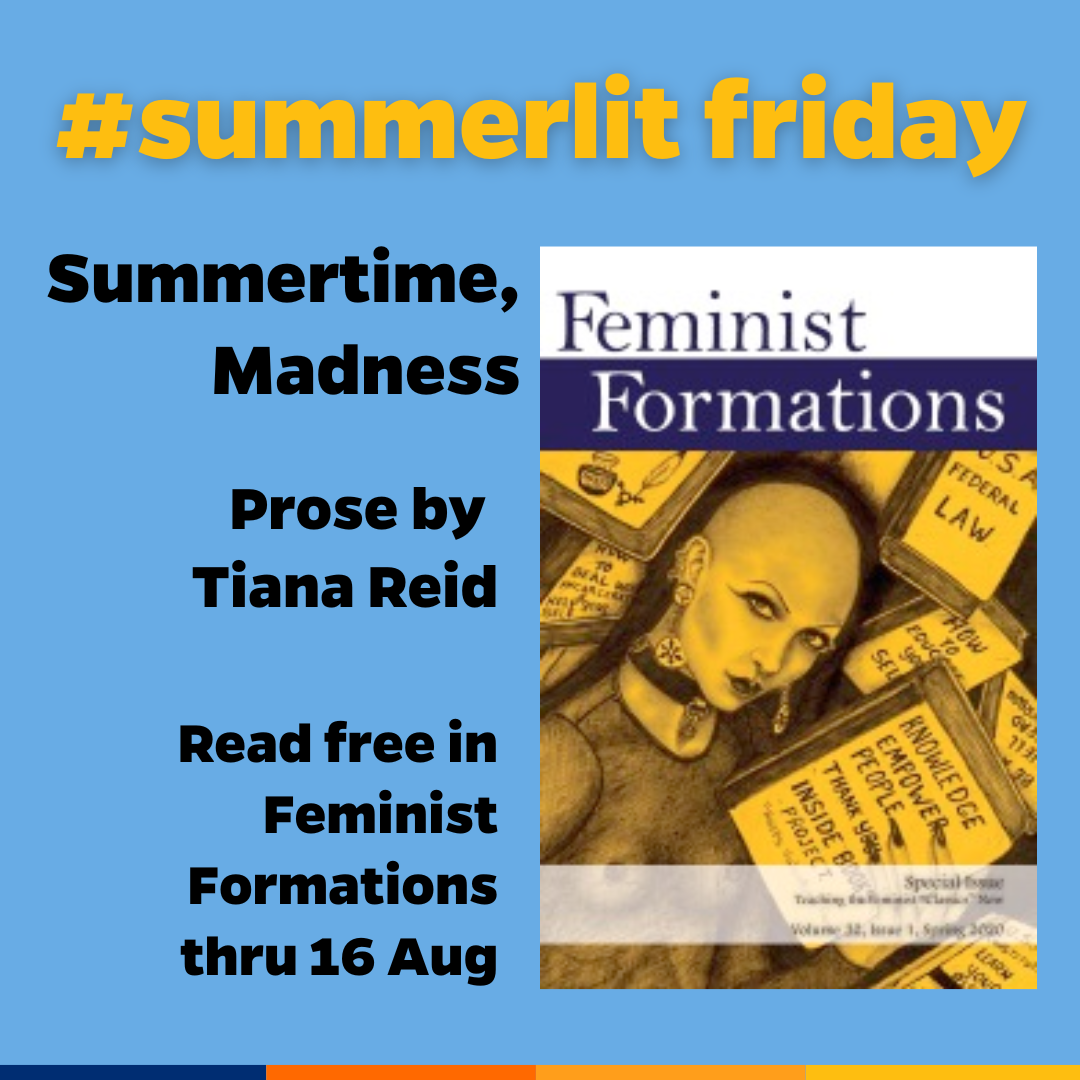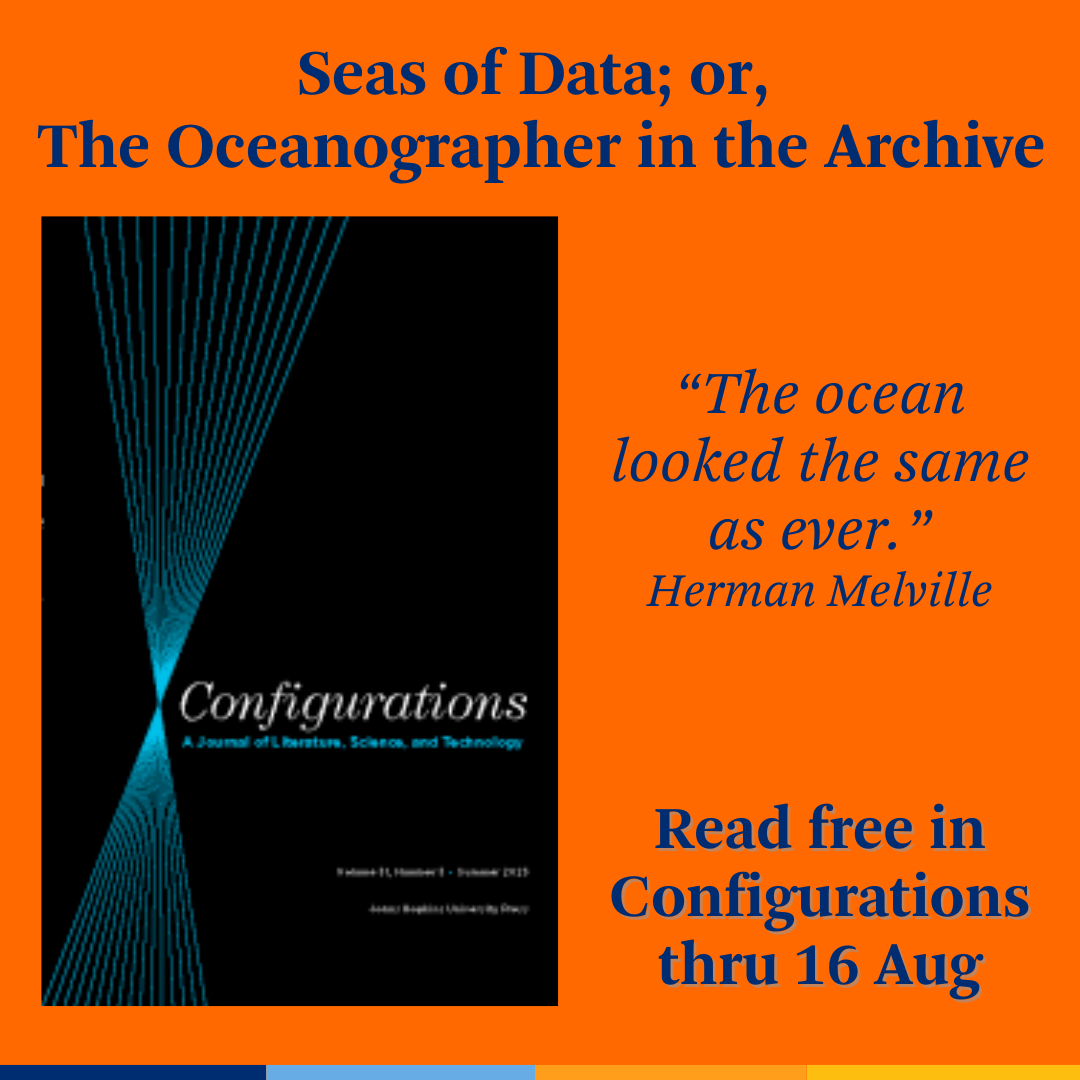
Johns Hopkins UniversityEst. 1876
America’s First Research University
ICYMI: New & Notable Articles (12 Aug 2024)


The Olympiad
Ben V. Olguín
Callaloo
Volume 31, Number 2, Spring 2008
It’s an #OlympicWeek #SummerLit Friday!
Today, we offer “The Olympiad,” a poem by Ben V. Olguín from the Spring 2008 issue of Callaloo
Read free at Project MUSE thru 31 August

De-exceptionalizing Sunisa Lee: Uneven Gymnastics and a Hmong American State-less Critique
Kong Pheng Pha and Kari Smalkoski
American Quarterly
Volume 75, Number 3, September 2023
In American Quarterly, Kong Pheng Pha and Kari Smalkoski analyze the media frenzy around Hmong American gymnast Sunisa Lee's rise to stardom during the 2020 Tokyo Olympics
Read free through 31 Aug

"Darktown Parade": African Americans in the Berlin Olympics of 1936
David Clay Large
Historically Speaking
Volume 9, Number 2, November/December 2007
In “Darktown Parade,” a vintage Historically Speaking article from 2007, David Clay Large explores the the political and social controversies surrounding African-American participation in the 1936 Berlin Olympics
Read free at Project MUSE through 31 Aug

Spiridon Loues, the Modern Foustanéla, and the Symbolic Power of Pallikariá at the 1896 Olympic Games
James P. Verinis
Journal of Modern Greek Studies
Volume 23, Number 1, May 2005
Spiros Loues, marathon champion at the first modern Olympiad in 1896, embraced the foustanéla, a traditional style of dress that helped elevate his mythology as a multlivalent symbol of Greek identity
Read more in Journal of Modern Greek Studies, free thru 31 Aug

Going for the Bronze: Modernism vs. the Old Guard at the Olympic Art Competitions
Miles Osgood
Modernism/modernity
Volume 28, Number 4, November 2021
Did you know that from 1912 to 1948, artists could win Olympic medals?
In Modernism/modernity, Miles Osgood explores the history and artistic tensions between Modernism vs. the Old Guard in the Pentathlon of the Muses
Read free thru 31 August

The Five Rings and the “Imagined Community”: Nationalism and the Modern Olympic Games
Toby C. Rider and Matthew P. Llewellyn
SAIS Review of International Affairs
Volume 35, Number 2, Summer-Fall 2015
From 2015: Toby C. Rider and Matthew P. Llewellyn explore the numerous forms of nationalism associated with the Olympic Games over the history of the games
Read free in SAIS Review of International Affairs thru 31 Aug
#OlympicWeek

Machado de Assis at the Rio Olympics
Lauren Groff
Sewanee Review
Volume 125, Number 1, Winter 2017
From 2017: Lauren Groff reads Machado de Assis at the Rio Olympics, and meditates on the ways artists and athletes alike “publish new versions of ourselves — win or lose, succeed or fail — over and over again”
Read free in Sewanee Review thru 31 August

Summertime, Madness
Tiana Reid
Feminist Formations
Volume 32, Issue 1, Spring 2020
We continue #SummerLit Friday today with "Summertime, Madness" — a prose meditation on a Toronto summer by Tiana Reid — from the Spring 2020 issue of Feminist Formations
Enjoy free through 16 August

Journal of Indian Ocean World Studies joins Hopkins Press
Philip Gooding
Journal of Indian Ocean World Studies
Volume 8, Number 1, 2024
We are thrilled to welcome Journal of Indian Ocean World Studies to the Hopkins Press roster as our first platinum open-access journal.
The new issue is out now, including new articles by Mathew Ruguwa and Hans Hägerdal, conversations with associate editor Philip Gooding, and more!
Read all about it at the Newsroom blog.

Ocean and Human Health in the Blue Era, Indian Ocean and African Perspectives
Rosabelle Boswell
Journal of Indian Ocean World Studies
Volume 6. Number 2, 2022
One of our State of the Field Essays: Boswell draws on her research in the Blue Humanities to make a rubric for integrating locally produced, embodied, and sensorial responses to the challenges of climate change in coastal and oceanic areas

Africa, the Indian Ocean World, and the ‘Early Modern’: Historiographical Conventions and Problems
Gwyn Campbell
Journal of Indian Ocean World Studies
Volume 1. Number 1, 2017
From the first issue: Campbell sets out what’s at stake in Indian Ocean World Studies, including the ability to contest Eurocentric framing devices. Here, he tackles temporal paradigms, especially the so-called ‘early modern’ period.

Reimagining the Aapravasi Ghat: Khal Torabully's poetry and the indentured diaspora
Shanaaz Mohammed
Journal of Indian Ocean World Studies
Volume 4. Number 2, 2021
Mohammed challenges current efforts to commemorate the period of indenture in Mauritius. She asks: How can literature inform cultural heritage, especially as they relate to indenture and other forms of bondage?
Ruth Mostern on The Yellow River: A Natural and Unnatural History
Ruth Mostern
Journal of Indian Ocean World Studies
Volume 7. Number 2, 2023
Mostern discusses her award-winning book, The Yellow River, in the JIOWS’ Conversations section. Readers learn of the methodological efforts that underpin one of the most celebrated books in environmental history from the last few years.
Children on Board: Child labor on ships in the Indian Ocean, c. 18th – 19th Centuries
Sundara Vadlamudi
Journal of Indian Ocean World Studies
Volume 6. Number 2, 2022
Vadlamudi centres the ocean itself in an important field of Indian Ocean World Studies: the history of slavery and bondage. He shows how children experienced sea voyages as labourers on ship and in the port.

Seas of Data; or, The Oceanographer in the Archive
Felix Lüttge
Configurations
Volume 31, Number 3, Summer 2023
In “Seas of Data,” Felix Lüttge argues that the ocean of oceanography is not only a body of water, but also a data space transcending the boundary between land and sea
Read free in Configurations through 16 August

MLN Forum: Translators Reimagine Literary Citizenship in the Academy
Eleni Theodoropoulos and Bradley Harmon
MLN
Volume 138, Number 5, December 2023
How and when will translation receive recognition for its crucial role in the academic ecosystem?
Spanning the Hopkins Press blog & 9 articles in a new special issue of MLN, it's a lively and thoughtful 10-scholar forum, open access for a year thru March 2025














